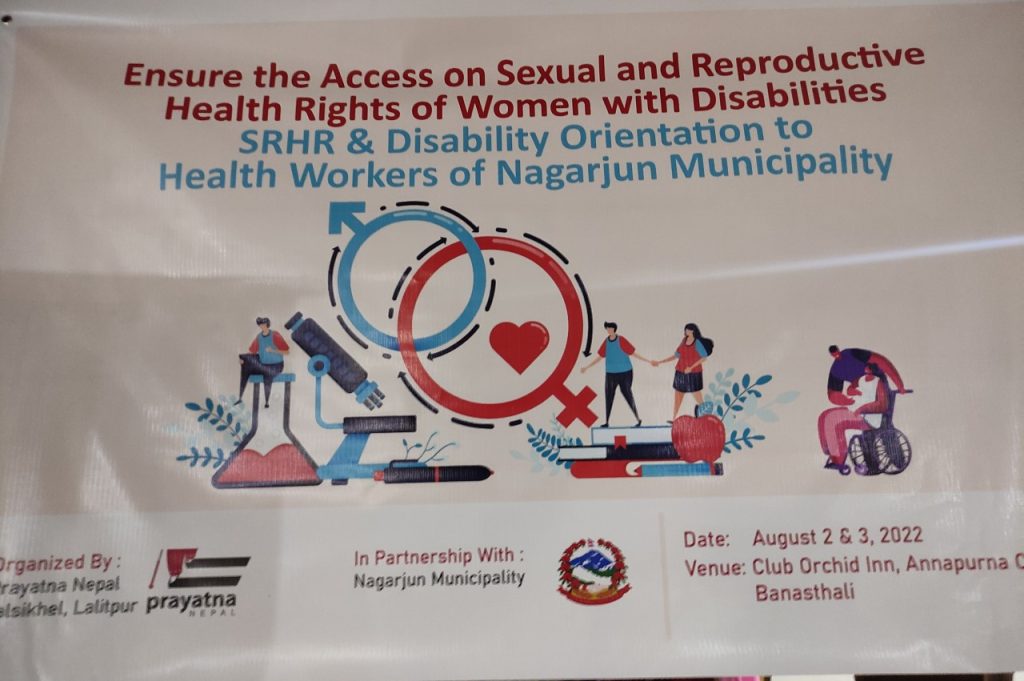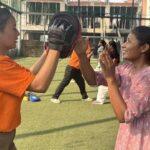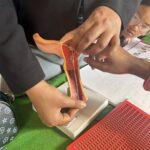
Prayatna Nepal is a nonprofit, non-religious and non-political women led organization established for the empowerment and rights promotion of women and girls with visual impairment. Since its establishment in 2015, Prayatna Nepal has been implementing various activities targeting to the visually impaired girls and women.
On the first day, chairperson of Prayatna Nepal, Ms. Sarita Lamichhane requested the participants to fill the pre-test questions before the program was formally started. She requested the logistics support staffs to distribute pre-test questions to individual participants in order to analyze their basic knowledge on SRHR and Disability. After collecting pre-test answers, she invited Ms. Jima Lamkolia, executive board member of Prayatna Nepal, who formally commenced the program by welcoming everyone. She highlighted the objectives of the orientation in her welcome remarks, while the team members distributed schedule of the program to the participants. Ms. Lamkolia then proceeded by asking individual participants and team members to introduce themselves. During the introduction round, everyone was asked to state their names, designation, and their first thought on what disability or persons with disabilities look like. After introduction, she asked the participants to jot down their expectations from two days orientation in relation to the planned sessions as per the schedule. She then invited Ms. Sarita Lamichhane, who was one of the facilitators of the orientation to facilitate the first day's sessions. Her first days' sessions included discussions on reproductive health rights care and inclusive SRHR. In order to educate the participants more about disability, she asked the logistic team to play a video documentary, which informed about types of disability on the basis of severity and functional limitations. Her session was basically focused on accessibility and universal design to ensure inclusion of persons with disabilities. She also talked about societal judgments and notions on SRHR and sexuality of persons with disabilities. Not only that, she used practical method to find out participants' understanding on disability. She then engaged the participants in a game to energize them as well as sensitize them on importance of accessible health related information and services to persons with disabilities which can be achieved by following universal design. Not only that, she also cleared some confusions among participants on terminologies used to address persons with disabilities. Through her sessions, she also encouraged participants to learn and use respectful terms and language to address persons with disabilities while providing health related services and information. After the interesting practical session, the participants all agreed that ensuring accessibility can promote inclusion of persons with disabilities. On the second day, the training started with participants sharing what they learnt in the previous day. Then Ms. Jima Lamkolia introduced the facilitator, Ms. Neera Adhikari, under-secretary of Department of Women and Children, to present on national policies related to persons with disabilities. She focused discussions on existing health/ SRHR policies related to persons with disabilities and the role of local level government. She highlighted that disability is not illness or crime but it is a situation and can happen to anyone at any time. She then proceeded to talk about provisions of Convention on the Rights of Persons with Disabilities (CRPD), Constitution of Nepal, Acts and Rules on the Rights of Persons with Disabilities, Local Government Operation Act and their roles. Her presentation briefly highlighted that local government is accountable and responsible to abide by all the international and national policies in order to ensure inclusive and participative human rights of persons with disabilities. After Ms. Neera's session, Ms. Sarita started her session by playing an informative video to encourage the participants to make efforts for accessible health services/information. She then again highlighted the importance of making such services/information is not only beneficial for persons with disability but for everyone as it makes the services more convenient and easy to use and understand. Then, she talked more about plight of family planning decisions in family with mentally disabled children/adolescents. She requested the health workers to be more thoughtful on individual human rights while providing services to persons with severe disabilities. She also encouraged the participants to provide proper counselling to the family/parents/guardians of such patients in their respective health posts. Moreover, she played an audio jingle broadcasted by Prayatna Nepal through Ujjyalo Network on making wise decisions for persons/children with disability who are unable to take their own decisions by putting major consideration to their human rights, privacy and bodily autonomy. Besides this, she also took suggestions from the participants regarding registration of persons with disabilities who come to seek medical or health related help to make both service giving and taking more convenient. At the end of the second day, Ms. Sarita Lamichhane asked the participants to fill up post-test questionnaires which showed remarkable increase in knowledge and understanding on SRHR and disability issues among the health workers. The participants were also asked to submit feedback so as to ensure better program organization in future by Prayatna Nepal. She then asked the participants to share their feelings about the orientation individually. After the sharing session, she welcomed Ms. Kamala Chapagain, a representative from Health Section of Nagarjun Municipality who shared overall learning and concluded the program with her closing remarks.



